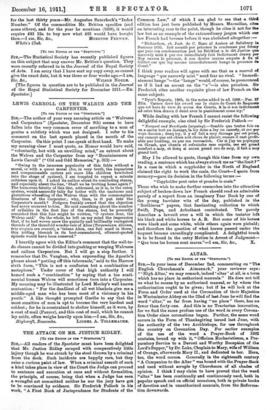LEWIS CARROLL ON THE WALRUS AND THE CARPENTER.
[To THE EDITOR OF THE "SPECTATOR."]
SIR,—The author of your very amusing article on "Walruses and Carpenters" (Spectator, December 9th) seems to have fallen into the very common error of ascribing to a man of genius a subtlety which was not designed. I refer to his comment on the last speech placed in the mouth of the Carpenter. On this point I can speak at first hand. To make my meaning clear I must quote, as Homer would have said, "voluntarily, but with an unwilling mind," an extract about
the Walrus and the Carpenter from my "Reminiscences of Lewis Carroll" (" Old and Odd Memories," p. 313) :— "Owing to the immense popularity of this fable without a moral, or with a queer moral (for, in very truth, the loquacious and companionable oysters are more like children bewitched into the shape of oysters), I am tempted to repeat a minute criticism upon it. I asked its author about its concluding stanza, and especially about the line, Shall we be trotting home again P' The humorous fatuity of this line, addressed, as it is, to the eaten oysters, would assuredly tally far better with the unctuous and gratuitous wheedling of the Walrus than with the commonplace bluntness of the Carpenter ; why, then, is it put into the Carpenter's mouth ? Dodgson frankly owned that the objection had never occurred to him. He said something about the number of syllables in the first line of the stanza, but he presently remarked that this line might be written, 0 oysters dear, the Walrus said.' On the whole, he left on my mind the impression that, if he had woven anew the quaintly and brilliantly variegated threads of the threefold wonder-tale of Alice (Tergeminam trick virginis era creavit), a 'triune Alice, one fair maid in three,' this trifling blemish in its best-remembered, oftenest-quoted episode would have been removed."
I heartily agree with the Editor's comment that the well-to- do classes cannot be divided into gashing or weeping Walruses and callous Carpenters. But I will go a step further. I
remember that Dr. Vaughan, when expounding the Apostle's phrase about "putting off this tabernacle," said to the Harrow sixth form, "This is not a confusion but a combination of
metaphors." Under cover of that high authority I will
hazard such a "combination" by saying that a too senti- mental human Walrus will sometimes turn into a Carpenter.
My meaning may be illustrated by Lord Morley's well known contention : "For the deadliest of all wet blankets give me a middle-aged man who has been most of a visionary in his youth." A like thought prompted Goethe to say that the most sensitive of men is apt to become the very hardest and coldest ; for he is constrained to shelter himself, as it were, by a coat of mail (Panzer), and this coat of mail, which he cannot lay aside, often weighs heavily upon him.—I am, Sir, &c.,


















































 Previous page
Previous page